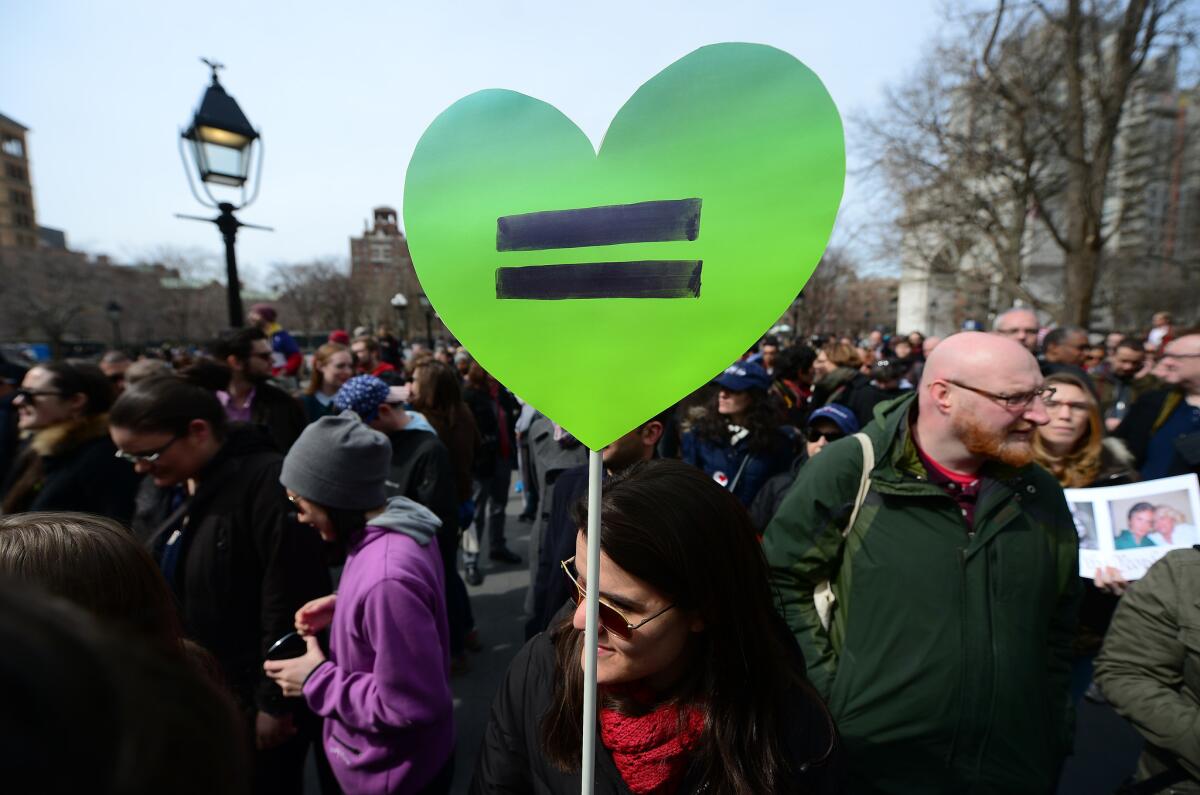Gay rights: Banished by love

“Why don’t you guys move home to the States?” my friends ask.
“Because,” I say, “although I am American, my partner is not, and because of DOMA, I can’t sponsor him for a green card.”
“But you’re married.”
TIMELINE: Gay marriage chronology
“Technically, we’re civil partnered, but immigration is a federal issue. It doesn’t matter that individual states recognize my relationship with my husband or partner, or whatever I choose to call him.”
“But that’s unfair.”
Yes, it is. My partner and I have been together for more than a decade. We celebrated our civil union in 2005 and hope someday to marry, perhaps in Britain, where we live (provided the coalition government manages to pass its same-sex marriage law), in California, where I was born, or in New York, where I was last a resident before moving to Britain as a student in 2001.
TIMELINE: U.S. immigration law
At the time of that move, I did not imagine I was leaving America permanently. I took one suitcase and a carry-on bag. I chose Oxford because it seemed like the ideal place to study English literature, and it was then cheaper than comparable institutions in the United States. I never imagined I might be embarking on a path that would make an unwilling exile of a temporary expatriate.
In the second year of my studies, I met my partner, who is South African by birth and had also come as a graduate student to Oxford. Two years ago we both acquired citizenship in Britain, although we also retain citizenship in our native countries. If we were a married heterosexual couple, my American citizenship would allow my partner to get a visa to live and work in the U.S. As it is, I feel every day the injustice of American laws that prevent me from living in the country of my birth and keep me from my aging parents, simply because I am committed to a person of the same sex who was not born in the United States.
Growing up in Omaha, I heard adventure and escape in the word “expatriate.” It evoked the characters of Hemingway — Jake Barnes, Bill Gorton — and seemed to offer more freedom than I knew how to find in Nebraska. “Exile” was another matter. Exiles were people who fled atrocity, war or political persecution, who had no other choice if they wanted to thrive or even survive. “Expatriate” was romantic; “exile” was a kind of banishment.
In other words, I started out as an expatriate, but I have become an exile. Even before transitioning to this state, I discovered there is little, in fact, that is romantic about being an expatriate. It left me feeling perpetually divided, neither here nor there, neither this nor that, an existential uncertainty made more acute, perhaps, by living in Britain, which lacks a convincing national narrative about the place of the immigrant in its society.
As for the United States, when I return I must always declare my residence abroad, my non-belonging here too. Over the years, as I evolved from expatriate to exile, my accent, body language, dress and manners all shifted. Now, whether I like it or not, people in my homeland mostly perceive me as a foreigner, one of “them” rather than one of “us.”
In his push for immigration reform, President Obama has called for protections for same-sex couples in whatever legislation may be passed by Congress. That’s in contrast to the bipartisan “group of eight” in the Senate, which includes one of my own senators — Charles Schumer (D-N.Y.), who, in this respect, is so far failing to represent my interests. Sen. John McCain (R-Ariz.), a member of the bipartisan group, has publicly insisted that solving the problems of couples like my partner and me would “derail” immigration reform because same-sex marriage and the human rights of same-sex couples are “controversial.”
Why should my ability to sponsor my legal partner for immigration purposes be in any way controversial? It is astonishing that justice of such an obvious kind should be thought so inconvenient. I can only hope that as America’s senators and representatives negotiate immigration reform legislation, they take into account people like me, my partner and countless others who seek to sponsor their spouses for immigration purposes.
And when the Supreme Court justices hear the case relating to the Defense of Marriage Act, I hope they bear in mind the varieties of profound “unhomeliness” created by a law that supposedly sought to protect home and family. Instead, DOMA made these fundamental aspects of life the preserve of a majority, at the expense of others who are told that the very ordinary way they go about their lives is a matter of politics, of mere controversy.
Whether or not I return permanently to the United States with my partner, my husband, I would like to have the choice to do so. As it stands, the injustice of DOMA and U.S. immigration law is so at odds with the narrative of American equality, it makes me wonder whether exile might promise not just more immediate but also more enduring liberty than the prize of coming home.
Patrick Flanery’s first novel, “Absolution,” will be published in paperback in the U.S. on April 2.
More to Read
A cure for the common opinion
Get thought-provoking perspectives with our weekly newsletter.
You may occasionally receive promotional content from the Los Angeles Times.






